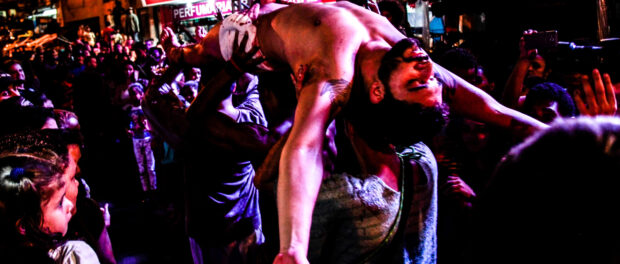
Via Sacra da Rocinha, Rocinha’s ‘Way of the Cross’ enactment, was conceived by Aurélio Mesquita—the former director of the production. Having encountered the book O Homem de Nazaré – a Via Sacra de Hoje (The Man of Nazareth – Today’s Way of the Cross), by José Maria Rodrigues, Mesquita imagined the possibility of staging that work in the streets of the Rocinha favela in a performance that responded to the author’s proposal to contextualize the story of the passion and death of Christ within everyday themes in our society. To put this idea into practice, Mesquita invited friends and amateur actors from the community to set up and stage the first edition of Via Sacra in 1992.
This is how a show in the format of street theater emerged, and residents of Rocinha have since staged it every Good Friday in the favela.
As the years passed, this originally modest idea grew and became an important artistic and cultural project of Rocinha. The performance, which only takes place once a year, gradually became a tradition for the community and began to attract many spectators. At the same time, in each edition the installation of the piece mobilized different people and theater groups active in Rocinha.
In 2015, a bill by City Councilor Paulo Pinheiro was passed, declaring Via Sacra da Rocinha Intangible Cultural Heritage of the City of Rio de Janeiro. This recognition highlights its importance as street theater and as a favela cultural manifestation.
An important part of Via Sacra is the theater company Roça Caçacultura. Its history is inseparable from that of Via Sacra, because it is another cultural movement that arose under the influence of Aurélio Mesquita.
In 1997 Mesquita organized a theater workshop at the CIEP Ayrton Senna, a school that mainly serves Rocinha residents. This workshop led to the creation of a play called Fragmentos da Roça (Fragments of Rocinha), the product of research conducted by the young workshop participants about the history and customs of Rocinha.
This piece gave rise to the Roça Caçacultura theater company, which among other activities became part of the cast of Via Sacra da Rocinha.
Aurélio Mesquita was in charge of the artistic direction of Via Sacra until 2016, when he moved away from Rocinha. Robson Melo took his place with the difficult mission of preparing the cast in just over a week for the 25th anniversary edition of Via Sacra da Rocinha in 2017.
Melo began his career in theater at Roça Caçacultura and later participated in Via Sacra as an actor, producer, and, since last year, artistic director.
Via Sacra da Rocinha – 2018
As the organizers of the largest open-air theater spectacle in the city of Rio de Janeiro, the theater company Roça Caçacultura announces the 26th edition of Via Sacra da Rocinha, which will take place on March 30.
Led by community residents in the roles of producers, cast members, and executive and artistic directors, Via Sacra will once again use the streets of Rocinha as a backdrop to contextualize the passion and death of Jesus Christ with themes that mainly reflect the cases of social crucifixion that occur in our society.
For the artistic director, Robson Melo, the play’s themes in 2018 cannot escape the recent episodes of violence that have devastated Rocinha and received national and international media attention.
“The idea was to pay homage to Rocinha and her typically Northeastern identity, to produce a piece with references to the culture that gave origin to the life of the community. But once again, violence has become the primary focus in the city and the favela is again the stage of a sad spectacle of war between factions and of state aggression through police actions,” he said.
Celebrating yet another year of cultural resistance in defense of the arts, of life, and of the rule of law in the favela, the performance will also denounce other forms of violence that affect the favela’s everyday life due to the absence of public policy.
“This year, Via Sacra denounces the neglect of favelas. The organization and installation of the spectacle itself suffers the violence of neglect. Another year of struggle to stay alive, without sponsorship and without public support. We will talk about shootings, hunger, unemployment, and many other forms of violence,” Melo concluded.
The 26th edition of Via Sacra da Rocinha will be performed this Friday, March 30 at 8pm in Largo do Boiadeiro, Rocinha. The event is free.
Produced by by: Roça Caçacultura Theater Group
Executive Direction: Monique Silva and Camila Perez
Art Direction: Robson Melo
Text: José Maria Rodrigues
Partnership: TV Tagarela
Promotion: FavelaDaRocinha.com
Cleber Araujo is a resident of Complexo do Alemão, where, through social media, he shows the favela in its most diverse forms and moments.


